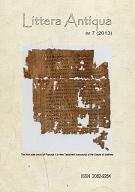Voegelin. Rhetoric and Politics in Aristotle
Voegelin. Rhetoric and Politics in Aristotle
Author(s): Katarzyna KołakowskaSubject(s): Literary Texts
Published by: Katolicki Uniwersytet Lubelski Jana Pawła II - Instytut Filologii Klasycznej
Keywords: Rhetoric; Politic; Aristotle; Voegelin
Summary/Abstract: The main aim of this paper is to analyze Eric Voegelin's interpretation of Aristotle using of rhetoric, primarily, although not exclusively, in political activity. Voegelin emphasizes the importance of rhetoric in Aristotle's political concept writing: “In his Rhetoric Aristotle intends to improve the current treatment of the subject matter in two respects. In the first place, he wants to give to deliberative rhetoric, i.e., to the statesman’s art of persuading his audience to a right course of political action, its proper place by the side of forensic and epideictic rhetoric. In the second place, he wants to raise rhetoric from an art of persuasion through play on emotions to an art of persuasion through reasoning. While neither forensic and epideictic rhetoric nor the play on emotions are neglected in the work, we are specifically interested in the intended improvements as they illuminate Aristotle’s attitude toward the practice of politics” (E. Voegelin, Order and History, ed. D. Germino, Missouri 2000, vol. III, p. 414). By following this path Voegelin recognized the Aristotelian philosophy of politics as specific "homeopathic dose" of "an attenuated influx of the Truth into politics". In this paper, the author intends to compare the Voegelin's interpretation with the text of Aristotle, taking issue with some of Voegelin's thesis. As a result, different conclusions, in relation to Voegelin's, emerge from the philosophy of Aristotle and his understanding of politics. The contest of paper is as follow: 1. Eric Voegelin's interpretation of Aristotelian rhetoric and its impact on the recognition of political issues. 2. Rhetoric of Aristotle and its meaning in Aristotelian political philosophy. 3. Conclusions
Journal: Littera Antiqua
- Issue Year: 2013
- Issue No: 7
- Page Range: 43-51
- Page Count: 9
- Language: English

